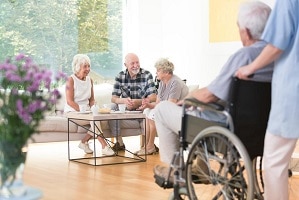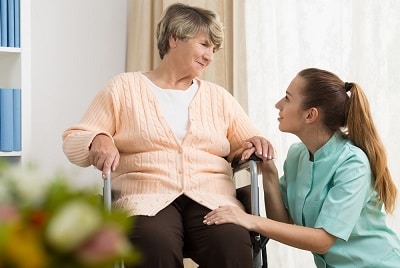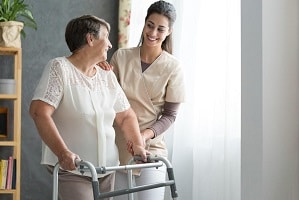 by: Olivia Parker
by: Olivia Parker
If you’re helping older loved ones prepare for a move to an assisted living community, you understand this time is full of emotions as your loved ones face a significant lifestyle change.
The situation can be challenging if your loved ones aren’t in favor of the move. Deciding to move from the home they have known for years is not an easy choice to make.
Assisted living housing allows your loved ones some degree of autonomy while providing you, and them, the comfort and security of knowing someone is there to help.
Your loved ones will understandably be anxious and somewhat stressed transitioning to an assisted living facility. They may be anxious about packing, sad to leave their home, and feel vulnerable about needing professional support for day-to-day living.
There are ways you can assist your elderly relatives and help alleviate the stress and anxiety.
Don’t Feel Guilty
As the responsible family member, you may be the one who has had to make this decision and help ease your loved ones into accepting it.
Don’t feel guilty. You have your loved ones’ best interests in mind. Feeling guilty will only make the process more stressful for you and your loved ones.
Avoid Procrastination
Once you realize it is time, don’t procrastinate. Discussing the need with your aging parents or relatives openly and honestly will minimize the stress for them and you.
It may be a difficult conversation to have, so include all your family members in the discussion, especially your elderly relatives. Remember, loss of control is one of the most often cited stressful factors to seniors at this time of their lives. Help them make the right choice, but do so in an inclusive way.
Ease into the Moving Process
Help your seniors ease into the moving process. Go with them to visit the assisted living community well before the scheduled move-in date. While there, introduce yourself and your family members to the staff. Perhaps you can arrange to visit at meal time and meet some of the other residents.
Review the rooms where they will be living. Discuss with them decorating ideas and where to place their possessions.
Cleaning and Repair
Don’t let your seniors shoulder the burden by themselves in getting their home ready for sale or rent after they move out. Start the cleaning and repair process early. Help them make a list of what needs to be done and help them find and manage the contractors or services that will do the work.
Paperwork
Another stressful part of moving into an assisted living home is completing the paperwork associated with their current home. Don’t let your seniors face this alone.
Help them make a list of things that need to be done, such as address changes, bank and credit card accounts, voter registration, and more.
Determining What and What Not to Keep
Your seniors’ home will likely contain a lot of heirlooms, keepsakes, and mementos. An assisted living apartment will not be able to accommodate everything.
Involve your seniors in the decision-making process about which possessions they will keep. Help them determine what items to take with them, and what ones to give away to other family members or to charity, or perhaps to put in storage temporarily. Letting go of a lifetime of possessions can be traumatic. Discuss storage options with a moving company if your loved ones can’t part with some of their belongings, but can’t take them to their new residence. Revisit the idea of getting rid of items in storage once they are settled.
When you use a professional moving service that is experienced in moving seniors and their possessions, you can assure them their belongings will be packed and handled with care.
Make Their Apartment Feel like Home
If possible, unpack their belonging before they arrive at the facility. Try to make your loved ones’ new living quarters as comfortable and like home as possible before they move in. Many assisted living communities encourage residents to bring their favorite furniture and other décor. Decorate their space with familiar objects, such as photographs, paintings, and throw pillows.
Keep their room well-stocked with snacks, books, and other entertainment. Arrange to have their newspaper and magazine subscriptions sent to their new address.
A favorite robe, a pair of slippers or toiletries are all things that can make the transition much easier and help preserve their dignity.
If your loved ones want to be there to unpack, make sure you are there, too. Learn about their new community and share their first meal with them to help smooth their transition to this new lifestyle.
Encourage Involvement
Encourage them to pursue their hobbies and interests. Learn what kinds of activities are available for residents and offer to participate in some of the activities with them.
Gently encouraging them to get involved by socializing can help them quickly adjust to assisted living.
 Technology Assists
Technology Assists
Moving can be a great time for you to demonstrate to seniors the advantages of the digital world. Show them some senior-friendly technologies that will make their lives not only easier but more fun.
For example, showing seniors how they can receive photos of family members using an iPad or smartphone will make them feel less isolated from their relatives. Show them how to Facetime, Skype, play games, do puzzles, and download podcasts, books, and magazines.
This, too, will help them maintain some independence, knowing they can reach out at any time and contact a loved one.
Don’t Be a Stranger
When your seniors first arrive, although they will make new friends, it can be a bit intimidating. Don’t let them think you are abandoning them. Set up regular visits and use the iPad or smartphone to remain in contact. Send small gifts to let them know you are thinking about them. Ask other family members to reach out regularly just to say “hello.” Check in with the staff frequently to make sure your loved ones are adjusting to their new environment.
Final Thoughts
Once the process is over, you may be surprised at your loved ones’ reaction to their new home. Alleviating the stress of coping by themselves in their home and eliminating feelings of loneliness can have surprising benefits.
They may just say to you, “Why didn’t we do this years ago?!”


 it.
it. 
 by: Olivia Parker
by: Olivia Parker
 Technology Assists
Technology Assists

 Find Activities
Find Activities